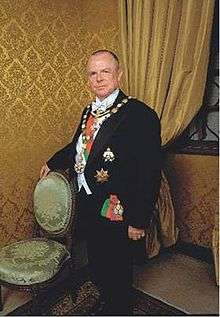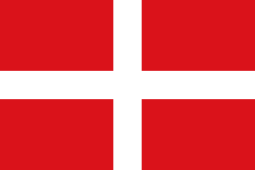Prince Luiz of Orléans-Braganza
| Prince Luiz | |||||
|---|---|---|---|---|---|
| Prince of Orléans-Braganza | |||||
 | |||||
| Head of the Imperial House of Brazil (disputed) | |||||
| Tenure | 5 July 1981 – present | ||||
| Predecessor | Pedro Henrique | ||||
| Heir presumptive | Bertrand, Prince Imperial of Brazil | ||||
| Born |
6 June 1938 Mandelieu-la-Napoule, France | ||||
| |||||
| House | Orléans-Braganza | ||||
| Father | Prince Pedro Henrique of Orléans-Braganza | ||||
| Mother | Princess Maria Elisabeth of Bavaria | ||||
| Religion | Roman Catholicism | ||||
| Brazilian Imperial Family (Vassouras branch) |
|---|
 |
|
Prince Luiz of Orleans-Braganza (born 6 June 1938) is the head of the Vassouras branch of the House of Orléans-Braganza and a claimant to the defunct Brazilian throne. The Vassouras branch claims the throne in opposition to the Petrópolis branch of the Orléans-Braganzas, headed by Prince Pedro Carlos of Orléans-Braganza. Though both Prince Luiz and Prince Pedro Carlos are great-great-grandchildren of Emperor Pedro II of Brazil, of the House of Braganza, they dispute leadership over Brazilian Imperial Family due to a dynastic dispute concerning their fathers, who were cousins.
Prince Luiz actively claims the throne and participates in matters concerning Brazil's imperial past.
Early life
Luiz Gastão Maria José Pio[1] was born on 6 June 1938, in Mandelieu-la-Napoule, France, as the oldest son Prince Pedro Henrique of Orléans-Braganza, the Vassouras great-grandson of Emperor Pedro II of Brazil, and his wife, Princess Maria Elisabeth of Bavaria, granddaughter of King Ludwig III of Bavaria. Through his father, he is a member of the Vassouras branch of the House of Orléans-Braganza, a cadet branch of the House of Braganza and the House of Orléans. Through both of his parents, Luiz is a cousin to many heads of royal families throughout the world, including Duarte Pio, Duke of Braganza, Henri Antoine, Hereditary Prince of Ligne, Archduke Leopold Franz of Austria, and Henri, Count of Paris. Luiz's godparents were Princess Maria di Grazia of Bourbon-Two Sicilies, his paternal grandmother, and Prince Ludwig of Bavaria, his maternal uncle. From his birth, Luiz has held the honorific styling of Dom (Lord) and the styling of His Imperial and Royal Highness and, until the death and succession of his father, he held the title of Prince Imperial of Brazil.
Although Prince Luiz was born after the revocation of the exile that had been imposed on the Imperial family by Brazil's first Republican government, the aftermath of World War I and World War II detained the entire family in Europe until 1945, when the Vassouras branch of the family was finally repatriated, settling first in the town of Petrópolis (Rio de Janeiro), then to Jacarezinho (Paraná).
On 1957, Luiz returned to Europe to finish his studies, where he graduated on Chemistry at the University of Munich.[2] Back to Brazil on 1967, when his family already moved to Vassouras (Rio de Janeiro), prince Luiz became a member of the Society for the Defense of Tradition, Family and Property,[3] a traditionalist Catholic organization which opposes Socialistic land reform and supports conservative politics based on the Catholic social doctrine and the principles promoted by Plinio Corrêa de Oliveira. Alongside Duarte Pio, Duke of Braganza, his Portuguese counterpart he opposes same-sex marital unions, as of a 2015 declaration.[4]
Succession
On 1981, he succeeded prince Pedro Henrique as the claimant to the Brazilian throne by the Vassouras branch. According to the legitimist claims, he is de jure Emperor of Brazil (Luiz I of Brazil).[5]
He and his young brothers, Prince Bertrand and Prince Antônio, are engaged in monarchist proselytism in Brazil. They played main roles during the campaign for the 1993 plebiscite, which represented the hitherto only real opportunity for a return of the monarchy since the Proclamation of the Republic, in 1889. In it, the people were asked to choose which form of government (presidential or parliamentary) and which form of State organization (Republic or Constitutional monarchy) Brazil should have. The monarchist cause was not successful, receiving 13.2% of the vote against 66% for the republic.[6]
Nowadays, Dom Luiz resides in a house with "no luxury nor splendor" in Higienópolis, a borough of São Paulo, Brazil.[7]
Titles, honours, and styles
| Styles of Prince Luiz | |
|---|---|
 | |
| Reference style | His Imperial and Royal Highness |
| Spoken style | Your Imperial and Royal Highness |
| Alternative style | Sir |
Honours
As Head of the House of Orléans-Braganza, Luiz Gastão holds the following positions:
.svg.png) Grand Master and Sovereign of the Imperial Order of Christ
Grand Master and Sovereign of the Imperial Order of Christ.svg.png) Grand Master and Sovereign of the Imperial Order of St. Benedict of Avis
Grand Master and Sovereign of the Imperial Order of St. Benedict of Avis.svg.png) Grand Master and Sovereign of the Imperial Order of Saint James of the Sword
Grand Master and Sovereign of the Imperial Order of Saint James of the Sword.svg.png) Grand Master and Sovereign of the Imperial Order of the Southern Cross
Grand Master and Sovereign of the Imperial Order of the Southern Cross.svg.png) Grand Master and Sovereign of the Imperial Order of Emperor Pedro I
Grand Master and Sovereign of the Imperial Order of Emperor Pedro I.svg.png) Grand Master and Sovereign of the Imperial Order of the Rose
Grand Master and Sovereign of the Imperial Order of the Rose
Luiz has also been decorated with a number of other honours:
.svg.png) House of Bourbon-Two Sicilies Grand Cross of the Sacred Military Constantinian Order of Saint George
House of Bourbon-Two Sicilies Grand Cross of the Sacred Military Constantinian Order of Saint George.svg.png) Grand Cross of the Order of the Immaculate Conception of Vila Viçosa
Grand Cross of the Order of the Immaculate Conception of Vila Viçosa Grand Cross of Honour and Devotion of the Sovereign Military Order of Malta
Grand Cross of Honour and Devotion of the Sovereign Military Order of Malta
Ancestry
References
- ↑ Casa Imperial do Brasil – Biografia de D. Luiz de Orleans e Bragança.
- ↑ CUNHA, Dionatan da Silveira (2011) (in Portuguese). Príncipe D. Luiz de Orleans e Bragança: 30 Anos de ascensão a Chefia da Casa Imperial do Brasil. Causa Imperial.
- ↑ Prince Bertrand of Orleans-Braganza Visits America. TFP.org, 2001-04-30.
- ↑ "Personalidades que firmaron".
- ↑ NÉMETH-TORRES, Geovani (2008) (in Portuguese). A odisséia monarquista no Plebiscito Nacional de 1993. In: Veredas da História. Rio de Janeiro: Ano I, n. 1. Abr. 2008. ISSN 1982-4238.
- ↑ Justiça Eleitoral. Resultado Geral do Plebiscito de 1993.
- ↑ SOARES, Regiane (2008) (in Portuguese). Príncipe imperial vive "sem luxo nem esplendor" em casa alugada em SP. Folha Online, 2008-03-04.
External links
| Prince Luiz of Orléans-Braganza Cadet branch of the House of Orléans Born: 6 June 1938 | ||
| Brazilian royalty | ||
|---|---|---|
| Preceded by Pedro Henrique |
Head of the Imperial House of Brazil (disputed) 5 July 1981 – present |
Incumbent Heir: Bertrand |
| Preceded by Pia Maria |
Prince Imperial of Brazil 6 June 1938 – 5 July 1981 |
Succeeded by Bertrand |
| Titles in pretence | ||
| Preceded by Pedro Henrique |
— TITULAR — Emperor of Brazil One of two pretenders to the Brazilian throne 5 July 1981 – present Reason for succession failure: Empire abolished in 1889 |
Incumbent Heir: Bertrand |
.svg.png)